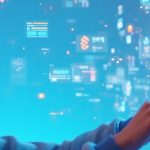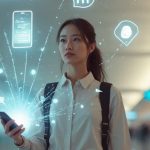This article was originally published by Ethic.
In the 2020s, so-called “augmented organizations” will be fundamental. These are organizations capable of harnessing the full power of AI to reinvent themselves —in the most human way possible— in every area, including sustainability. But where does this transformation begin?
Water. Air. Fire. Earth. The four elements of nature have always existed. Constant, infinite. And humans have continuously used them to reinvent themselves. Because innovation is purely human: it is a process of continuous adaptation to our new times. In the 1920s, Hemingway reinvented culture after the war. Companies grew thanks to electrification. Now, the new post-coronavirus 2020s bring an era powered by a new element: artificial intelligence (AI). This idea was the key narrative line of Converge Europe 2021, an online event organized by Globant with the aim of bringing together all agents of so-called augmented organizations. That is, those companies that are creating transformations that go beyond digital changes to harness the power of artificial intelligence and reinvent themselves in all areas, including sustainability.
On the virtual stage generated through augmented reality, several people from the technology sector tried to answer a broad question: Where should we start to reinvent ourselves? “Digitalization has the tools to create a fairer and more egalitarian world,” explained Martín Umarán, one of Globant’s four founders. “There is a dire need to accelerate sustainability beyond just words because it is one of the greatest challenges we face as human beings,” he added. But this must be approached from a human point of view.
This issue was addressed by Monique Morrow, former CEO of Cisco and founder of The Humanized Internet, an organization that works to ensure digital sovereignty all around the world and protect the rights of the most vulnerable users. “Technological disruption is also ethical. It is generating new schools of thought on morality. Human interactions are already represented in artificial intelligence,” she explained. And she added: “We assume that companies rely on data simply to grow, but now that more than 90% of the world’s data has been generated in just two years, we have the perfect opportunity to go beyond that.”
“Technology is generating new schools of thought on morality; human interactions are already represented in artificial intelligence”
Morrow
Finance, pharma and cybersecurity. Every economic field has a humanized path to follow so that AI, in addition to being attractive to company executives, can welcome customers and society at large. “It’s a balance between three aspects: human interaction, loyalty and profit,” added Morrow, who stressed the importance of leveraging the human aspect of artificial intelligence. “To motivate employees, to prevent fraud, to protect us as a society against virtual attacks… and also to ensure that no one is left behind in the digital transformation,” she stated.
This is not the first time that business and social spheres have come together. Many international organizations, from the United Nations to the European Commission, argue that companies, and their relationship with employees and the rest of society, are inseparable. “Now more than ever, customers want sustainable and fair relationships with companies. And that has been hard for companies to understand, but it is very good to get out of your comfort zone,” said Ángel Sáenz de Cenzano, Country Manager for Spain at LinkedIn and a guest at the event. “We were placing limits on ourselves that were not real. For example, there were many on-site jobs that could have been performed online a long time ago, and we refused to see it,” he recalled. That was until the pandemic tore everything down and uncovered three issues: the lack of attention to employees, the absence of flexibility and, above all, the blocking of talent.
“With all geographical boundaries blurred by the coronavirus, we have learned that we can find talent anywhere, and also within the company itself,” explained Sáenz de Cenzano considering how companies have opened their eyes, as they were forced to make schedules more flexible and take care of employees during the toughest months. “We have seen, first, that it is no longer the company that chooses the employee, but also the other way around,” he added. According to him, refusing to look beyond the four walls of the office has led to a major talent gap. “And now there are two ways in which we can address it. The first one is by turning to digital and analytics tools to attract employees. The second one involves developing internal mobility, understanding how to keep the workforce happy, and identifying their strengths.” Here, artificial intelligence also plays its part in boosting staff productivity and improving decision-making. In fact, according to the World Economic Forum, this technology can lead to the creation of 133 million new jobs. And it is capable of promoting more horizontal communication between management and staff.
Sustainable convergence
In October, the European Parliament adopted the first recommendations on artificial intelligence related to ethical, liability and intellectual property rights issues to pave the way towards an ethical framework for this technology. In that context, there is one word that has come up repeatedly: blockchain, which can be defined as a shared record of information protected and secured by advanced cryptography. It is difficult to hack and, therefore, it is currently the main topic of the conversation around the technological revolution and its advantages in the creation of a fairer society. For example, Morrow’s organization wants to use blockchain to provide an identity to over a billion stateless people who have no official identity and face numerous risks. This tool would provide them with a non-transferable digital number that would give them access to basic rights such as education, health or financial services.
“Now is the time to reclaim innovation for humanity, because disruption takes time, and we need to work on efficiency.”
Palt
Blockchain, according to the United Nations, is also capable of ensuring multilateralism, a key element in legitimizing the sustainability of the economic system: “It is through multilateral solutions that sustainable growth can be guaranteed, in a more plural way and with the participation of all citizens and parties involved.”
It is a convergence with multiple meanings that can help accelerate sustainability and, therefore, the fight against climate change. “We are now in a decade where it’s all about cooperation. Honestly, I don’t think anyone wants to tackle climate change alone at this point,” insisted Alexandra Palt, Chief Sustainability Officer and Executive Vice-President at L’Oreal. She added: “It’s true that we have made a lot of progress in terms of environmental issues, but I don’t want to do it alone. What I want is for our experience to serve as an example for other companies, because the green transition has to take place in an equitable society.” Elena Morettini, Director of Globant’s Business Sustainable Studio, describes this holistic vision in one term: the “360 ecosystem”. “An ecosystem that goes beyond its own meaning, that unifies everything under the same line of action,” she noted.
So, what do we need for that? “Personality, attitude, security. Companies need to set science-based goals and stop saying they’ll get to it later. We have nine years to figure it out,” said Palt. In other words, what we need is for companies to come down to earth with the help of technology. “For a long time, we’ve seen innovation as something that has to definitely foster humanity’s progress. But, at some point, we began innovating for the sake of it. Now is the time to reclaim innovation for humanity because disruption takes time, and we need to work on efficiency,” she added. Reinvent, again.




